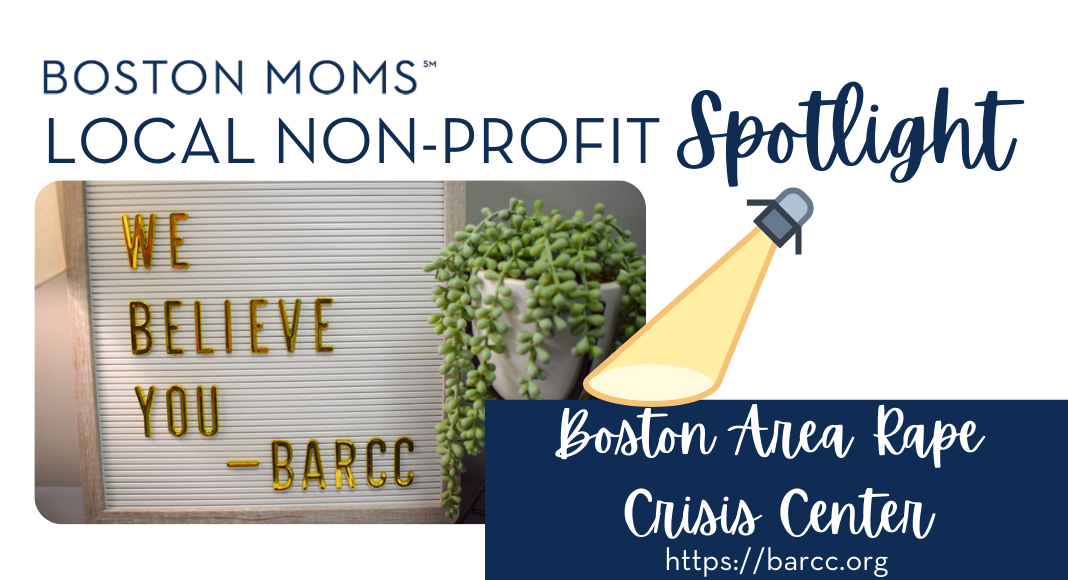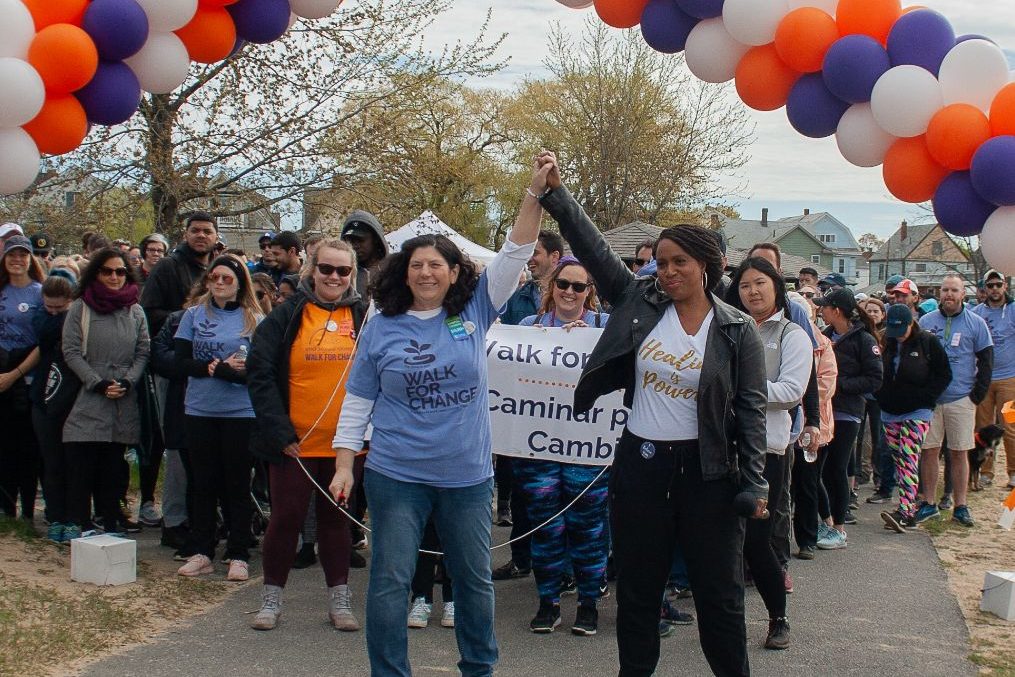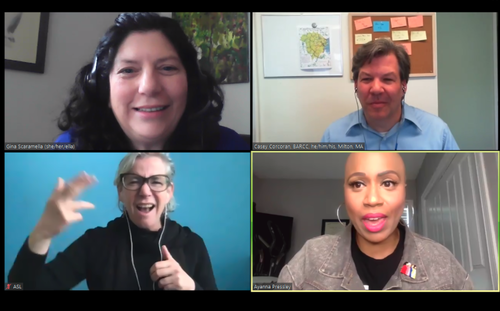The Greater Boston area is home to many exceptional nonprofits, but the ones that serve moms are especially close to our hearts. Boston Moms is excited to spotlight and support the local nonprofit organizations that make our area so great.
This month we are showcasing the Boston Area Rape Crisis Center.

The Boston Area Rape Crisis Center (BARCC) is working to end sexual violence through healing and social change. They provide free, confidential support and services to survivors of sexual assault, harassment, and abuse ages 12 and up and to their families and friends. This month, you can support them as they walk for change, connection, hope, and healing.
Join us in celebrating the Boston Area Rape Crisis Center by learning more about their mission and donating to their cause!
Where is your nonprofit located? Currently, we are providing all of our services remotely, and we serve 29 cities and towns in the Greater Boston area. When we open for in-person services, we have three offices: Cambridge (Central Square), Boston (on Commonwealth Ave. at the Family Justice Center), and Waltham (Moody Street area).
What services does the Boston Area Rape Crisis Center offer? We provide free, confidential support and services to survivors of sexual assault, harassment, and abuse ages 12 and up and to their families and friends. We work with survivors of all genders from the immediate crisis after sexual violence to years and decades later, and our goal is to empower survivors to heal. We also work with a wide range of organizations and communities, including schools, colleges, and police, to advocate for change. We provide training in how to respond to survivors and create cultures that prevent sexual violence in the first place.
In what way does BARCC support local moms? First, we know that many moms out there are survivors, and all of our services are here for them. Second, families are really central to our work; they make up vital support systems for survivors, and we recognize that family members of survivors need support, too. We have individual and group counseling for parents and significant others of survivors, and they can also access our other programs. Third, our community education and prevention trainings help moms and all sorts of family and community members learn how to support survivors and ways to take action to end sexual violence.
What is your favorite part of working for BARCC? My favorite part is really seeing the impact we can have in supporting survivors and their families. I’ve seen, countless times, survivors go from receiving services to being in a place where they want to give back and doing so in some really amazing ways, from sharing their experiences as part of our Survivor Speakers Bureau or supporting other survivors as a volunteer to becoming part of our staff or being active in our annual events like the Walk for Change. (We’re having our Virtual 15th Walk on April 25!)

What is one thing you wish parents would know if their child discloses to them that they’re a survivor of sexual abuse? BARCC is absolutely here for you, and you don’t have to navigate this alone. It’s important to hold space for your child’s emotions and assure them that you are there to support them. Try to be in a listening space as much as possible and then seek out support. As a parent, you can call our hotline or request services to get support for yourself; we provide services for youth ages 12+, so if your child wants support they can call the hotline or request services online as well.
Lots of parents are trying to have open conversations with their teens about sexual violence. What are some important talking points? It really is so important to have these conversations — and I know they’re not easy! I’m a parent myself, so I’ve been there. With all the many myths and misinformation out there, it’s key to share factual information, and you can do that in the course of talking about movies, books, or the news. Make sure they understand that often people who perpetrate sexual violence are people the survivor knows, and they start with smaller inappropriate behaviors.
It’s important to talk about boundaries and how to discuss them, and empower your kids in setting boundaries. It’s also important, as your kids start dating and forming intimate relationships, to talk about consent in a way that’s easily understood. For example, teens know they need to ask for a friend’s permission before posting a photo of them to Instagram or sharing it on Snapchat. That’s an example of how to gain consent, and it’s transferrable to dating. And of course, making sure your kids know about BARCC is always a good idea!
Talk to us about the importance of counseling for a mom who is also a survivor. Counseling can really help you sort out your feelings and reactions, understand the impacts of sexual trauma, and explore coping skills. It can also support you in deciding how or what to share about your own experience with your kids. For moms who are survivors and also supporting a child who has experienced sexual assault or abuse, it can help you figure out how to best support your child, separate your own experience, and make sure you’re getting the support you need. We know from working with survivors that some people may go for years feeling like they’re on solid ground, and then something will come up that brings up reactions and feelings. Whenever that happens, whether it’s years or decades later, you deserve support.
How would a mom get in touch with BARCC to get support? You can always reach out to our hotline for in-the-moment support: 800-841-8371 (24-7) or via web chat at barcc.org/chat (9 a.m. to 11 p.m. every day).
You can also request services on our website.
In addition to our hotline, we have medical advocacy, counseling, legal advocacy, and case management (assistance with health, housing, financial, and safety needs) services. We also offer educational trainings and workshops and our Youth Leadership Corps (moms, please let your high schoolers know about this)!
How do donations to BARCC help? Your donations make healing and hope possible for survivors and their loved ones. They support our free, confidential services as well as our advocacy and education programs that work to change the culture and end sexual assault, harassment, and abuse. This past year, as we’ve all experienced the impacts of COVID-19, donations have enabled us to transform our services to be delivered remotely while ensuring privacy, which has been vital at a time when most survivors are facing increased isolation. Donations have also made it possible for us to respond to a surge in requests from survivors facing hunger and homelessness during COVID-19. We know survivors can’t focus on their healing when they’re worried about paying the bills and feeding their families, so this support has been critical.

How would a mom get involved? Moms and their families are a big part of our annual Walk for Change, which takes place during Sexual Assault Awareness Month and is a very concrete way families can support survivors in their lives. This year is our Virtual 15th Walk for Change! It’s going to be an inspiring event celebrating community, healing, and hope. And it helps raise vital funds for BARCC’s free services. We’re really excited for the event on April 25 and urge everyone to register and donate today! And we even provide info on how to talk with your kids about why you’re taking part in the walk. We also have a variety of volunteer opportunities and other ways to give to the organization.
You can donate to the Boston Area Rape Crisis Center HERE. You can join the Virtual Walk for Change HERE. Look for BARCC on Facebook, Instagram, Twitter, LinkedIn, and their website!
Are you interested in being highlighted in a Boston-Area nonprofit spotlight, or do you know an organization that deserves this recognition? Let us know! Please email Chelsey Weaver at [email protected] to discuss a feature.














